Amazon, IDrive, IBM, Google, NetApp and Wasabi offer some of the top enterprise data storage solutions. Explore their features and benefits, and find the right solution for your organization’s needs.
In the event of a system malfunction, cyberattack or other tech emergencies, maintaining an effective data storage solution can make the difference between a business failure or a swift recovery. Data storage can offer numerous advantages to organizations, allowing them to store their files securely and providing easy access to authorized individuals.
Many different data storage technologies are available to companies today, including ones that provide cloud storage, network-attached storage, direct attached storage, hybrid storage options and more. This article discusses the best storage solutions available to modern organizations, from small businesses to enterprises and everything in between. It details each top storage product’s notable features, pros and cons to help you determine whether your organization would benefit from them.
Jump to:
Top data storage software comparison
With the right data storage software tool, you can rest easy knowing that your sensitive organizational data is protected. Consider how each of the following top data storage software solutions compare in terms of pricing and key features.
Amazon Simple Storage Solution: Best for flexibility
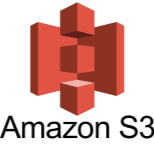
Amazon Web Services offers businesses an entire portfolio of storage solutions, allowing them to secure their organizational data on the cloud (Figure A). This article will focus on the Amazon Simple Storage Service, which provides object storage with easy retrieval for authorized users.
Figure A
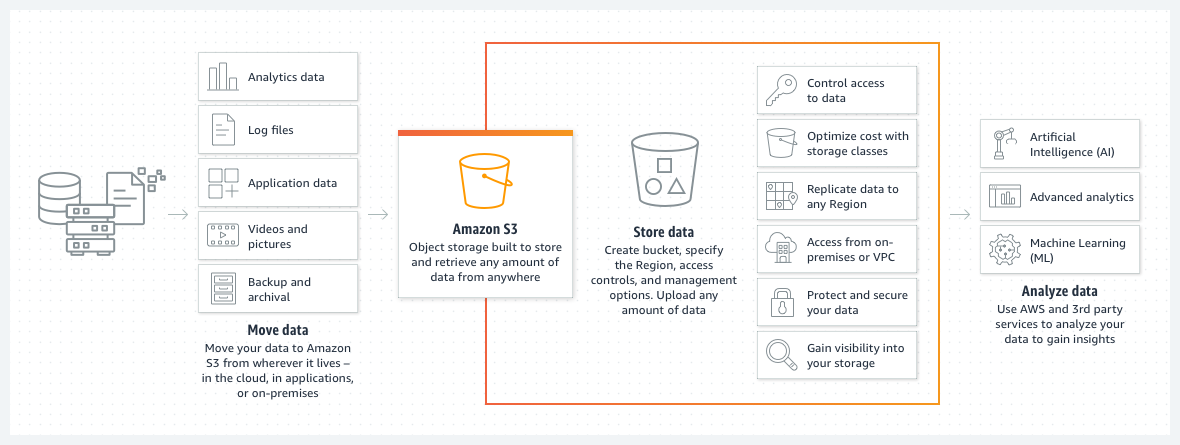
The Amazon Simple Storage Service leads in flexibility and scalability, as organizations can store and secure any quantity of data and use secure access controls to manage their data based on their needs. The storage analytics and insights features provide visibility into significant trends and offer suggestions to help companies optimize their data storage. Amazon also provides a range of services that simplify data migration onto the AWS storage solution, though these are not included with their storage solutions.
Pricing
Users pay for Amazon Simple Storage each month at a rate based on the size of the objects they wish to store as well as the duration of storage, their chosen storage class and the frequency with which they access their data. Their storage classes include:
- S3 Standard: $0.023 per GB for the first 50 TB per month, $0.022 per GB for the next 450 TB per month and $0.021 per GB for over 500 TB per month.
- S3 Intelligent-Tiering: $0.0025 for every 1,000 objects over 128 KB for all tiers.
- Frequent Access Tier: $0.023 per GB for the first 50 TB per month, $0.022 per GB for the next 450 TB per month and $0.021 per GB for over 500 TB per month. Extra storage is $0.021 per GB.
- Infrequent Access Tier: $0.0125 per GB per month for all storage.
- Archive Instant Access Tier: $0.004 per GB per month for all storage.
- Archive Access Tier: $0.0036 per GB per month for all storage.
- Deep Archive Access Tier: $0.00099 per GB per month for all storage.
- S3 Standard-Infrequent Access: $0.0125 per GB per month for all storage.
- S3 One Zone-Infrequent Access: $0.01 per GB per month for all storage.
- S3 Express One Zone: $0.16 per GB per month for all storage.
- S3 Glacier Instant Retrieval: $0.004 per GB per month for all storage.
- S3 Glacier Flexible Retrieval (Formerly S3 Glacier): $0.0036 per GB per month for all storage.
- S3 Glacier Deep Archive: $0.00099 per GB stored per GB per month for all storage.
Additionally, users can gain 5 GB of S3 standard storage for 12 months with the AWS Free Tier.
Features
- Storage management and monitoring.
- Data analytics.
- Storage insights.
- Storage optimization features.
- Server-side encryption and client-side encryption for data uploads.
Pros
- Customers are able to estimate their storage costs using the AWS Pricing Calculator.
- Amazon Simple Storage places no limits on data storage, making it a scalable choice for growing organizations.
- The solution analyzes data and provides visibility into object storage usage, storage access patterns and offers recommendations to improve cost-efficiency and data protection.
Cons
- Users are charged per-request ingest fees for using certain rules to move data into an S3 storage class.
- Businesses that store data within the S3 Intelligent-Tiering storage class are charged additional monitoring and automation monthly fees.
IDrive BMR Pro: Best for on-site data backups

IDrive offers data backups to protect organizations from data loss through their product, IDrive BMR Pro (Figure B). The solution provides onsite bare-metal disaster recovery services that ensure business data continuity using cloud replication. This means the organizational data from local servers, devices and even virtual machines is backed up to a local device that can perform bare metal restoration in the case of an emergency.
Figure B
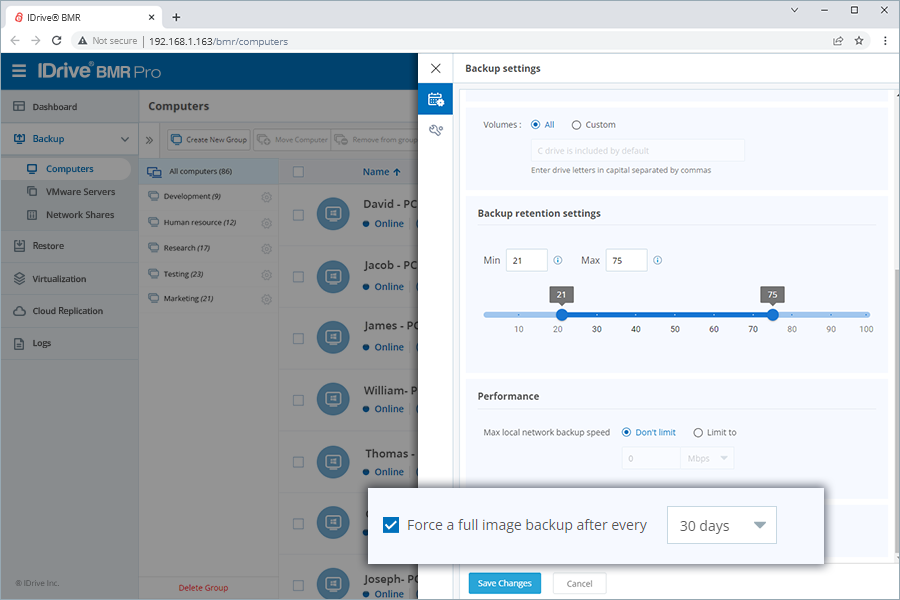
In addition to point-in-time version recovery, IDrive BMR enables businesses to create network shares on their local IDrive BMR devices. Companies can even replicate their locally stored data onto their IDrive cloud accounts or easy browser-based access.
Pricing
The pricing for this solution is not publicly advertised on the vendor’s website. Buyers are encouraged to contact the vendor to receive a custom quote.
Features
- Image-based data backups.
- Hosted networks.
- Local data security.
- Cloud data security.
- Granular restore options.
Pros
- Businesses have many options for restoring their systems, including to restore the entire system or individual folders and files.
- Local and cloud data are secured with AES-256 CCM encryption to protect them from unauthorized access.
- The data deduplication and compression features will ensure higher storage efficiency and better I/O performance.
Cons
- IDrive does not provide transparent pricing for their IDrive BMR Pro software.
IBM Storage Protect for Cloud: Best for SaaS data storage

IBM offers several storage solutions for organizations to secure and manage their sensitive information, with products for data protection, software-defined storage, storage area networks, tape storage and hybrid storage arrays, to name just a few. The IBM Storage Protect for Cloud solution stores and secures sensitive cloud data (Figure C).
Figure C
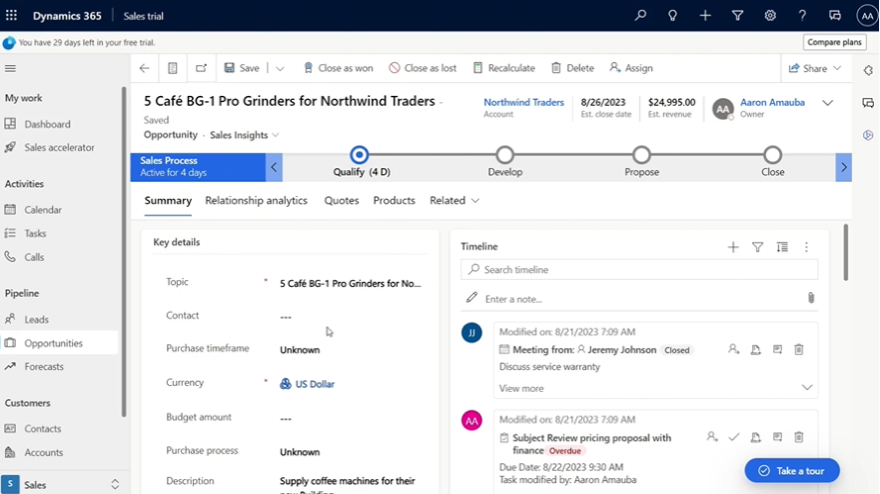
Companies can safeguard their software-as-a-service data across several popular platforms, including Azure, Microsoft 365, Dynamics 365 and Salesforce. With enterprise-grade security and multilayered defense, businesses can rely on IBM Storage Protect for Cloud to protect their data across their cloud environments.
Pricing
The pricing for this solution is not publicly advertised on the vendor’s website. Buyers are encouraged to contact the vendor to receive a custom quote.
Features
- Granular data recovery.
- Data encryption.
- Backup data tracking.
- Data management features.
- Backup data reporting.
Pros
- The solution comes with a 30-day free trial for Microsoft 365, Dynamics 365, Microsoft Azure and Salesforce.
- IBM Storage Protect provides key operational data recovery and risk mitigation to ensure business continuity.
- The software can automate data management and other IT processes.
Cons
- IBM Storage Protect for Cloud is available only across Microsoft Azure, Microsoft 365, Dynamics 365 or Salesforce.
Google Cloud Storage: Best for Google Cloud users

Companies big and small can leverage Google Cloud Storage for their unstructured data (Figure D). Google Cloud integrates with many top analytics and ML/AI tools, making it an excellent choice for larger companies with data-intensive workloads. On the other hand, smaller companies will appreciate the solution’s inexpensive storage pricing and the free storage provided to customers each month.
Figure D
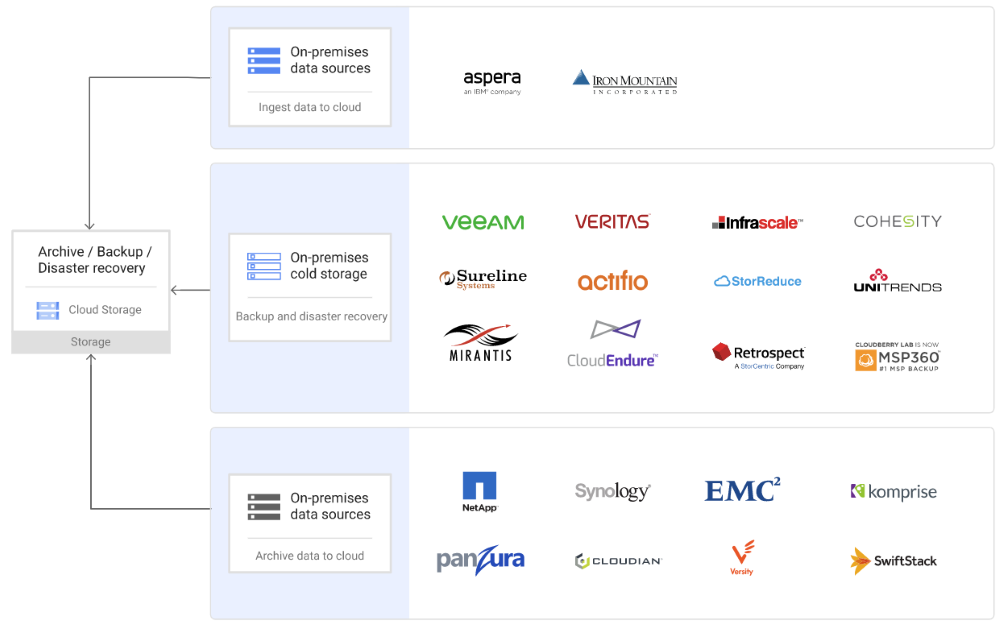
Organizations can use Google Cloud for various data management purposes in addition to satisfying their data storage and safeguarding needs. For instance, businesses can use Google storage to host static content online or use Google Cloud to develop data lakes for storing and managing large quantities of data.
Pricing
Google Cloud Storage services are priced based on the buyer’s storage class, network usage and network egress.
- Always Free Storage: Customers receive 5 GiB of US regional storage free per month.
- Storage Class:
- Standard Storage: Starting at $0.02 per GiB per month.
- Nearline Storage: Starting at $0.01 per GiB per month.
- Coldline Storage: Starting at $0.004 per GiB per month.
- Archival Storage: Starting at $0.0012 per GiB per month.
- General Network Usage: Ranges from $0.12-$0.20 based on monthly usage
Additionally, network egress within Google Cloud applies when copying, accessing or moving data in Cloud Storage or between Google Cloud services. This pricing is dependent on the user’s network product.
Features
- Geo-redundant storage.
- File inventory reports.
- Dual-region buckets.
- SLA-backed replication.
- Admin activity logs.
Pros
- Stored data is accessible to authorized organizational users across geographic regions, making it an ideal choice for dispersed teams.
- Google Cloud Storage does not charge fees for data retrieval or early deletion.
- The solution supports multiple storage options, including standard storage, archival storage, nearline storage and coldline storage.
Cons
- Location and operation fees may apply based on storage class.
NetApp StorageGRID: Best for hybrid data storage

NetApp’s unified data storage solutions offer intelligent data services for businesses to enhance and simplify the maintenance of their data structures (Figure E). Companies can use Netapp’s StorageGRID to easily manage their structured and unstructured data within a single operating data storage environment, whether on-premises with flash storage or in cloud environments.
Figure E
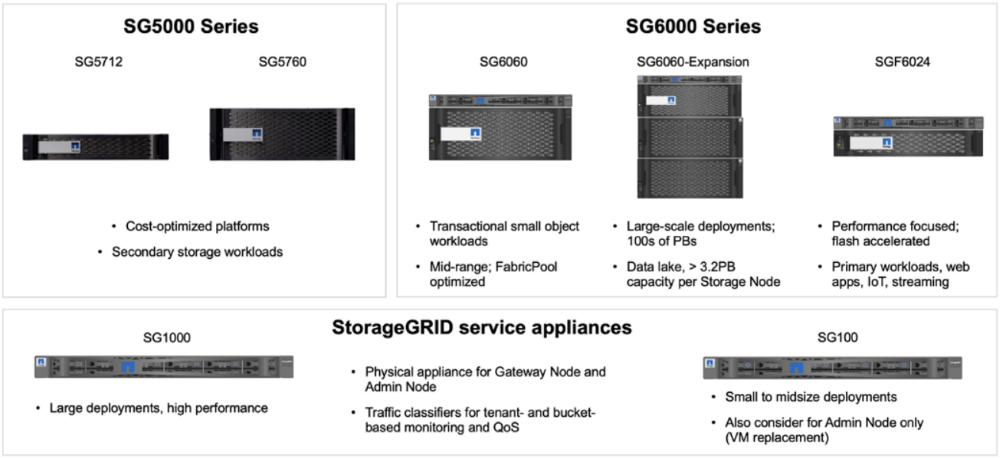
The flexibility of Netapp’s unified data storage makes it a fan favorite among enterprises. The StorageGRID solution provides object storage across public, private and hybrid multicloud locations. This allows organizations to choose the best deployment method for their needs, as it supports deployment across physical environments, virtual environments or a combination of both.
Pricing
NetApp StorageGRID pricing depends on the buyer’s chosen appliance model. However, the pricing for these solutions is not publicly advertised on the vendor’s website. Buyers are encouraged to contact the vendor to receive a custom quote.
Features
- Native support for the Amazon S3 API.
- Flash, cloud and hybrid storage.
- Data backup and archiving.
- Self-healing data durability.
- Object-native quality of service storage.
Pros
- StorageGRID has purpose-built load balancers that can scale according to business needs.
- The software can be integrated with many top business solutions, including DataFrameworks, Rubrik CDM and Snowflake.
- StorageGRID provides solutions for data protection as well as data governance.
Cons
- NetApp’s software may be overly expensive for smaller organizations or businesses on a budget.
Wasabi Hot Cloud Storage: Best low-cost storage option

Companies on a budget will also appreciate Wasabi Hot Cloud Storage for its impressive data storage capabilities at a reasonable rate (Figure F). Its simplistic single-tier pricing makes calculating the final price of the solution simple for buyers, as it is based on their storage needs, with no additional fees for the egress of API calls.
Figure F
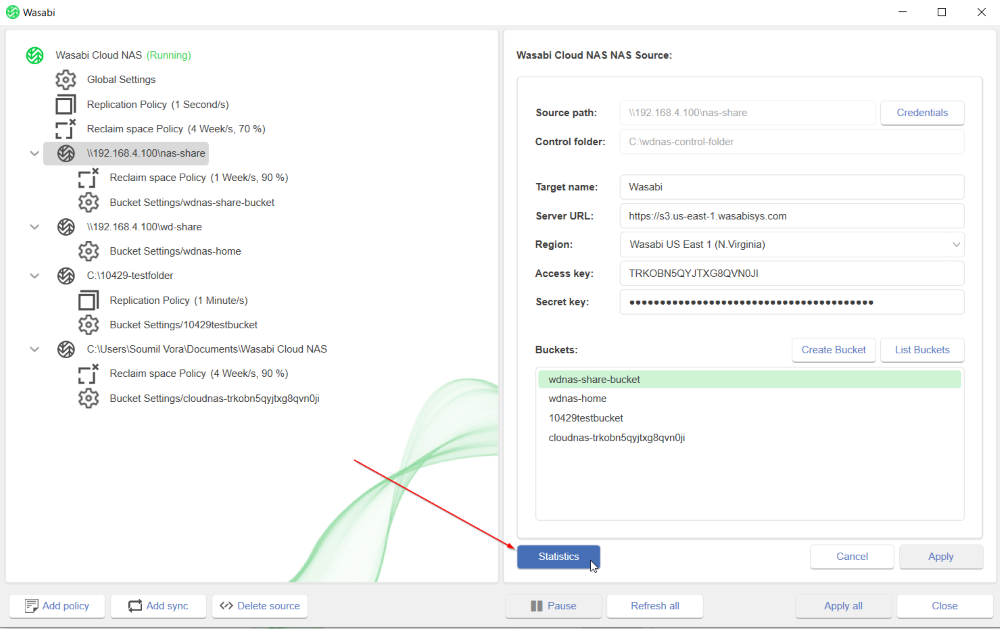
Wasabi Hot Cloud Storage provides options for buyers wishing to use private networks and allows them to quickly cloud-enable their on-premises VMS devices.
Pricing
Wasabi Hot Cloud Storage can be purchased as a Pay As You Go service for $6.99 per TB per month ($.0068 per GB per month.)
Alternatively, businesses can also choose the Reserve Capacity Storage option, which allows them to purchase reserved storage in 1-, 3- or 5-year increments with no fees for egress or API requests. This option has a premium support plan, and buyers can visit the website to request a free quote.
Features
- Data center redundancy.
- Bucket replication.
- Data immutability.
- Access to archived content.
- Immutable cloud backups.
Pros
- Wasabi Hot Cloud Storage does not charge extra fees for testing and restoring backups.
- Storage immutability protects businesses against accidental deletions and ransomware.
- Buyers of the Reserve Capacity Storage option can achieve greater discounts for term and capacity.
Cons
- Third-party software may be necessary when moving large volume files across servers.
How do I choose the best data storage software for my business?
Essential factors to look for in a quality data storage software solution would be robust security features, data archival capabilities and data storage management tools. Of course, the best data storage software for a particular business will depend on a variety of unique aspects, such as budget, storage capacity needs and data management requirements.
Consider the cost of the solutions along with the amount of data storage your business would require to determine whether it would be an affordable option for long-term use. Additionally, more scalable solutions are ideal for expanding companies requiring more storage space.
An additional factor to consider when deciding upon a data storage solution would be whether the software has data analytics and reporting features, allowing your business to derive valuable insights from stored data and data usage. Finally, seeking a product that can integrate with your existing storage system is always helpful, as this can ease the process of transferring your current organizational data onto the new system.
Review methodology
This is a technical review using compiled literature researched from relevant databases. The information about each storage solution provided in this article is gathered from the vendor’s websites or based on an aggregate of user feedback to ensure a high-quality review.
In researching numerous data storage tools, we compiled our list of products based on their features, scalability, pricing and ability to support business data storage operations.
